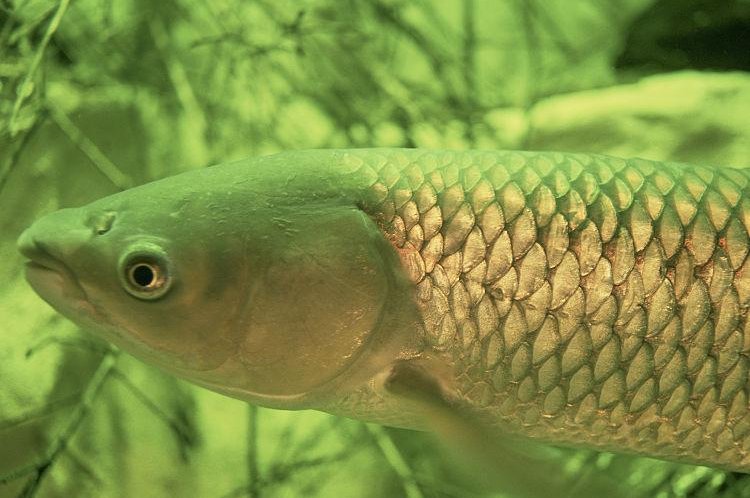A grass carp, one of several invasive Asian carp species in the U.S. Photo by CC/Eric Engbretson
COLUMBIA, Mo., Feb. 16 (UPI) -- Some scientists suggest the best way to beat the Asian carp is to eat the Asian carp. But the question remains whether diners will oblige.
Asian carp, of which there are several varieties, are probably America's most infamous invasive species. Disruptive populations of bighead and silver carp have been propagating throughout the Mississippi basin for several decades. And policy makers in the Midwest are lobbying the federal government to spend billions to protect the Great Lakes from the fish's arrival.
But while dams and other protective measures could prove sufficient farther north where rivers meet lakes, Asian carp are entrenched in much of the waters -- still and flowing -- of the South and Midwest. Researchers at the University of Missouri have been looking to make the best of the situation by encouraging the marketability of several Asian species.
Researchers and chefs at the Columbia-based school recently offered up Italian fish stew, pasta puttanesca, and seafood chowder (all featuring Asian carp) to hungry students, faculty and staff. Taste-testers were asked to rate each dish. All three faired moderately well -- the chowder and pasta more so than the stew.
"No one disliked the stew," Tim Wall, who helped collect and analyze the ratings data, explained in a press release. "It was more so-so for the stew, perhaps because everyone so liked the chowder."
The research was organized by Mark Morgan, an associate professor at the university's School of Natural Resources, with the help of the Campus Dining Services. Morgan says the latest testing shows the fish is palatable enough for a wider audience. Previous findings have shown that the carp varieties are healthy, too -- less mercury than tuna and more omega-3 fatty acids than salmon.
Scientists say other conservation methods are necessary to eradicate the scaled invaders, but eating a few more bowls of carp chowder could speed things along. Commercials fishing has nearly extinguished other (well-liked) species of fish, after all. So why not hone the resource-hungry power of the market on a more deserving target -- grass-eating, ecosystem-wrecking invasive fish.
"Human consumption alone won't solve the problem," Wall told the Columbia Tribune. "But also, we don't want people to become dependent on the carp, because the idea is to eradicate them. This is just a way to use them in the meantime while eradicating them."















